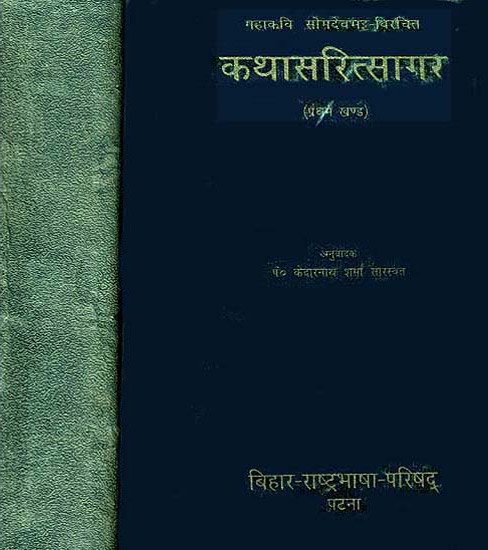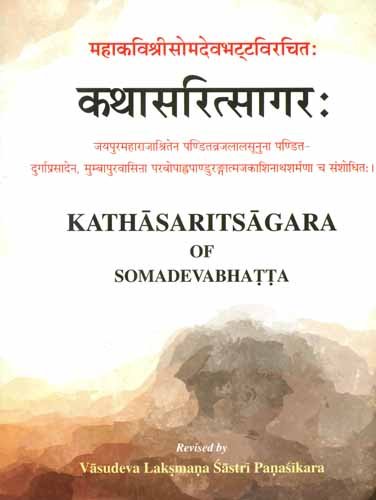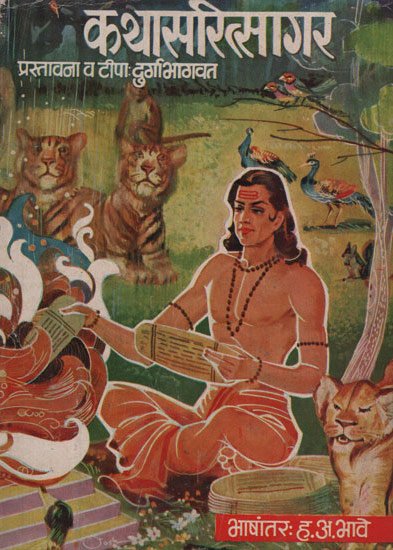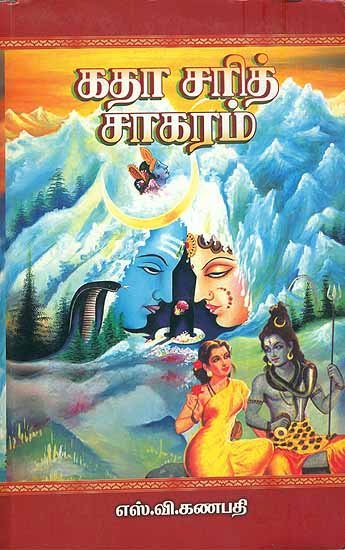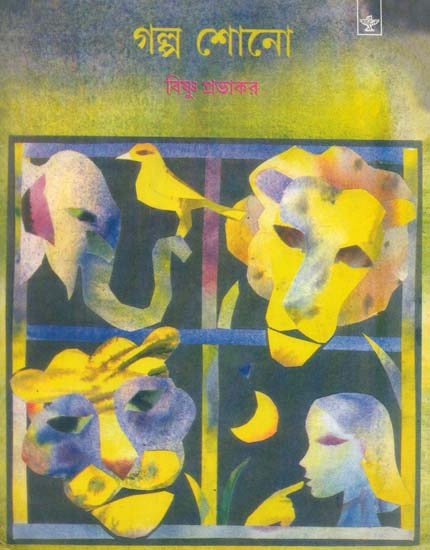Kathasaritsagara [sanskrit]
by C. H. Tawney | 2014 | 226,424 words | ISBN-13: 9789350501351
The Sanskrit edition of the Kathasaritsagara referencing the English translation and grammatical analysis. Written by Somadeva and dating from the 12th century, the Kathasaritsagara (or Katha-sarit-sagara) represents an epic legend narrating the adventures of Naravahanadatta as he strives to become the destined emperor of the Vidyadharas. Alternative titles: (Kathāsaritsāgara, कथासरित्सागर, Kathā-sarit-sāgara)
Verse 9.5.234
अवाप च स वासरैः कतिपयैर् गृहं श्वाशुरं विदर्भविषयाश्रितं तदथ कुण्डिनाख्यं पुरम् ।
समृद्धिमति तत्र च श्वशुरसत्कृतः कानिचिद् दिनान्यभजत स्थितिं तनयदारसेनायुतः ॥ २३३ ॥
avāpa ca sa vāsaraiḥ katipayair gṛhaṃ śvāśuraṃ vidarbhaviṣayāśritaṃ tadatha kuṇḍinākhyaṃ puram |
samṛddhimati tatra ca śvaśurasatkṛtaḥ kānicid dinānyabhajata sthitiṃ tanayadārasenāyutaḥ || 233 ||
The English translation of Kathasaritsagara Verse 9.5.234 is contained in the book The Ocean of Story by C.H. Tawney. This book is available online or you could buy the latest edition:
Read online Buy now! The English translation by C.H. Tawney (2014)
Glossary of Sanskrit terms
Note: This extracts Sanskrit terms and links to English definitions from the glossary, based on an experimental segmentation of verse (9.5.234). Some terms could be superfluous while some might not be mentioned. Click on the word to show English definitions.
Avapa, Vasara, Katipaya, Grih, Shvashura, Vidarbha, Visha, Vishaya, Ashrita, Tada, Tha, Kundi, Kundin, Kundina, Pur, Pura, Samriddhimat, Tatra, Satkrita, Kim, Cit, Dina, Sthiti, Tanayat, Arasa, Ayuta,
Analysis of Sanskrit grammar
Note: this is an experimental feature and only shows the first possible analysis of the Sanskrit text (Kathasaritsagara Verse 9.5.234). If the system was successful in segmenting the sentence, you will see of which words it is made up of, generally consisting of Nouns, Pronouns, Verbs, Participles and Indeclinables. Click on the link to show all possible derivations of the word.
- Line 1: “avāpa ca sa vāsaraiḥ katipayair gṛhaṃ śvāśuraṃ vidarbhaviṣayāśritaṃ tadatha kuṇḍinākhyaṃ puram ”
- avāpa -
-
avāpa (noun, masculine)[compound], [vocative single]avāpa (noun, neuter)[compound], [vocative single]
- ca -
-
ca (indeclinable conjunction)[indeclinable conjunction]ca (noun, masculine)[compound], [vocative single]ca (noun, neuter)[compound], [vocative single]
- sa -
-
sa (noun, neuter)[compound], [vocative single]sa (noun, masculine)[nominative single]
- vāsaraiḥ -
-
vāsara (noun, masculine)[instrumental plural]vāsara (noun, neuter)[instrumental plural]
- katipayair -
-
katipaya (noun, masculine)[instrumental plural]katipaya (noun, neuter)[instrumental plural]
- gṛham -
-
gṛha (noun, masculine)[adverb]gṛhā (noun, feminine)[adverb]gṛh (noun, masculine)[accusative single]
- śvāśuram -
-
śvāśura (noun, masculine)[adverb], [accusative single]śvāśura (noun, neuter)[adverb], [nominative single], [accusative single]
- vidarbha -
-
vidarbha (noun, masculine)[compound], [vocative single]
- viṣayā -
-
viṣaya (noun, masculine)[compound], [vocative single]viṣā (noun, feminine)[instrumental single]
- aśritam -
-
aśrita (noun, masculine)[adverb], [accusative single]aśrita (noun, neuter)[adverb], [nominative single], [accusative single]aśritā (noun, feminine)[adverb]
- tada -
-
tada (noun, masculine)[compound], [vocative single]tada (noun, neuter)[compound], [vocative single]
- tha -
-
tha (noun, masculine)[compound], [vocative single]tha (noun, neuter)[compound], [vocative single]
- kuṇḍinā -
-
kuṇḍina (noun, masculine)[compound], [vocative single]kuṇḍi (noun, masculine)[instrumental single]kuṇḍin (noun, masculine)[instrumental single]kuṇḍin (noun, neuter)[instrumental single]kuṇḍinā (noun, feminine)[nominative single]
- akhyam -
-
√khyā (verb class 2)[aorist active first single]
- puram -
-
pura (noun, masculine)[adverb], [accusative single]pura (noun, neuter)[adverb], [nominative single], [accusative single]purā (noun, feminine)[adverb]pur (noun, feminine)[accusative single]
- Line 2: “samṛddhimati tatra ca śvaśurasatkṛtaḥ kānicid dinānyabhajata sthitiṃ tanayadārasenāyutaḥ ”
- samṛddhimati -
-
samṛddhimat (noun, masculine)[locative single]samṛddhimat (noun, neuter)[locative single]
- tatra -
-
tatra (indeclinable adverb)[indeclinable adverb]tatra (indeclinable correlative)[indeclinable correlative]tatra (indeclinable)[indeclinable]
- ca -
-
ca (indeclinable conjunction)[indeclinable conjunction]ca (noun, masculine)[compound], [vocative single]ca (noun, neuter)[compound], [vocative single]
- śvaśura -
-
śvaśura (noun, masculine)[compound], [vocative single]
- satkṛtaḥ -
-
satkṛta (noun, masculine)[nominative single]
- kāni -
-
ka (noun, neuter)[nominative plural], [vocative plural], [accusative plural]kim (pronoun, neuter)[nominative plural], [accusative plural]
- cid -
-
cit (noun, feminine)[compound], [adverb], [nominative single], [vocative single]cit (noun, masculine)[compound], [adverb], [nominative single], [vocative single]cit (noun, neuter)[compound], [adverb], [nominative single], [vocative single], [accusative single]
- dinānya -
-
dina (noun, neuter)[nominative plural], [vocative plural], [accusative plural]
- abhajata -
-
√bhaj (verb class 1)[imperfect active second plural], [imperfect middle third single]
- sthitim -
-
sthiti (noun, feminine)[accusative single]
- tanayad -
-
√tan -> tanayat (participle, neuter)[nominative single from √tan class 10 verb], [vocative single from √tan class 10 verb], [accusative single from √tan class 10 verb]
- ārasenā -
-
ārasa (noun, masculine)[instrumental single]
- ayutaḥ -
-
ayuta (noun, masculine)[nominative single]
Other editions:
Also see the following editions of the Sanskrit text or (alternative) English translations of the Kathasaritsagara Verse 9.5.234
Kathasaritsagar
by Kedarnath Sharma Saraswat (2005)
The Only Edition with the Sanskrit Text and its Hindi Translation (An Old and Rare Book) Set of 3 Vol.
Buy now!
Kathasaritsagara of Somadeva Bhatta (Sanskrit Text Only)
by Vasudeva Laksmana Sastri (2013)
Katha Sarit Sagar in Marathi
by H. A Bhave (1995)
Set of 5 Volumes; Published by Varada Books, Pune. 2256 pages (Throughout B/W Illustrations).
Buy now!
Katha Sarit Sagara (Tamil)
by S. V. Ganapati (எஸ். வி. கணபதி) (2014)
[கதா சரித் சாகரம்] Published by Alliance Publications.
Buy now!
Galpa Shono
by Abhijit Chattopadhyay (2014)
[গল্প শোনো] Galpa Shono: Bengali Translation of 'Suno Kahani From Katha Sarit Sagar'; 9788126015436; Published by Sahitya Akademi, Delhi.
Buy now!Preview of verse 9.5.234 in Bengali sript:
অবাপ চ স বাসরৈঃ কতিপযৈর্ গৃহং শ্বাশুরং বিদর্ভবিষযাশ্রিতং তদথ কুণ্ডিনাখ্যং পুরম্ ।
সমৃদ্ধিমতি তত্র চ শ্বশুরসত্কৃতঃ কানিচিদ্ দিনান্যভজত স্থিতিং তনযদারসেনাযুতঃ ॥ ২৩৩ ॥
![Kathasaritsagara [sanskrit] - book cover](/uploads/a/Katha-Sarit-Sagara.jpg)
